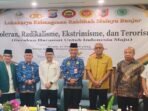Jakarta – The extraordinary events of the COVID-19 pandemic have prompted the Ministry of Communications and Information Technology and other elements of the nation to continue to adapt and move forward.
“Tomorrow 31 December 2020 we will leave 2020 and pick up 2021 which we pray for will bring new hope to our people and nation,” said Minister of Communication and Information Johnny G. Plate in the Virtual Press Conference on implementing Digital Transformation Acceleration from the Multipurpose Room of the Ministry of Communications and Information, Jakarta., Wednesday (30/12/2020).
The Minister of Communication and Information stated that 2020 can be a special year when all elements of the nation continue to face COVID-19.
“Every year, of course, has its own lessons and features, but we can say 2020 to be a special year. The pandemic keeps everyone adapting and moving forward against COVID-19, “he said.
In the next year, Minister Johnny is optimistic that collaborative work will make Indonesia a connected one. “With reformative and transformative collaborative work, of course, let’s make Indonesia connected, more digital, more advanced!” he said.
10 Years Faster
The Minister of Communication and Informatics detailed some results of hard work and close collaboration of all stakeholders in the communication and informatics sector. “what we have done, in 2020 the Ministry of Communications and Information will carry out five things,” he explained.
First, according to Minister Johnny, the Ministry of Communications and Information Technology continues the develop of ICT infrastructure, increasing national telecommunications connectivity through efforts to develop digital infrastructure to reduce digital divide.
According to the Minister of Communication and Information, the Ministry of Communications and Information will continue the effort to equalize internet access by deploying access in 12,548 villages and sub-districts.
“As all of us, we already know that the 4G network has not reached 83,218 villages and sub-districts in Indonesia with 4G signal services based on data from the 2016 Population and Civil Registry Service,” he explained.
According to Minister Johnny, we plan the project to implemented in the next two years. “Or at the end of 2022 we hope they will complete it and it will be ten years faster than the initial completion plan in 2032 if they do it,” he said.
The Minister of Communication and Information stated that the Public Service Agency of the Telecommunication and Information Accessibility Agency (BAKTI) built 9,113 BTS in villages and wards in the 3T area.
“While the remaining 3,435 are in non-3T areas and become the work areas and commitments of all cellular operators,” he said.
Besides construe of BTS, the Ministry of Communications and Information has also built internet access services at 4,400 public facility service points.
“Of which 3,126 points are the locations of health service facilities or health facilities,” said Minister Johnny.
The Ministry of Communications and Information is accelerating to complete the provision of connectivity to support health facilities activities by 2020, faster than the initial plan for completion in 2027
“Or 7 years earlier, so that all hospitals and health centers in Indonesia totaling 3,013 including those in 3T areas at the end of this year already have internet access,” said the Minister of Communication and Information.
Literacy and Digital Ecosystems
The second thing, Minister Johnny stated that the Ministry of Communication and Information intensively continues to strive to improve digital literacy and skills.
“The National Digital Literacy Movement (GNLD) Siberkreasi has provided basic level digital skills training. This year’s GNLD Siberkreasi has succeeded in becoming Winner of the World Summit on the Information Society (WSIS) Prizes 2020 from the United Nations, “he explained.
Meanwhile, to improve intermediate digital skills, the Ministry of Communications and Information Technology provides a training stimulus for Digital Talent Scholarship.
“DTS has provided training for around 58,000 participants, of which 34,333 have been certified nationally and globally. And there will still be more, “explained the Minister of Communication and Information.
Third, in creating a more productive digital ecosystem, the Ministry of Communication and Information issues several key regulations. “In 2020, there are several regulations in the informatics and communication sector that have been passed,” said Minister Johnny.
The Minister of Communication and Information explained about Law no. 11 of 2020 concerning Job Creation (Job Creation Law) in the Post, Telecommunications, and Broadcasting (Postelsiar) sector.
According to him, the Job Creation Law regulates infrastructure access cooperation that can accelerate the equitable distribution of Indonesia’s digital connectivity.
“This provision also becomes a strong legal basis for digitalization of broadcasting by setting a deadline for migration in November 2022, less than two years from now,” he explained.
According to Menter Johnny this is a big step because broadcast digitization can improve broadcast quality to be clearer, and to provide a digital dividend of around 112 MHz.
“Which can be used to optimize the 4G signal in 3T areas and implement 5G technology. Besides, it is also regulated in this law which is related to spectrum sharing, increasing the business of broadcasting and digitalization of broadcasting, “he explained.
The Minister of Communication and Informatics believes that these efforts will provide a multiplier effect for Indonesia’s economic growth. Citing a 2017 study conducted by the Boston Consulting Group, Minister Johnny stated that by 2026, broadcast digitization is projected to encourage 181 thousand additional new business activities.
“There will be 232 thousand additional new job opportunities and additional Non-Tax State Revenue (PNBP) of Rp. 77 trillion. Broadcast digitization also has the potential to contribute to national GDP up to Rp. 443.8 trillion, “he explained.
In supporting the digital ecosystem, Minister Johnny has issued Ministerial Regulation (Permen) Number 4 of 2020 concerning the Use of Radio Frequency Spectrums in the 2.3 GHz Radio Frequency Band.
“Specifically, this regulation encourages the achievement of the target of adding radio frequency spectrum for broadband services of 30 MHz by 2020,” he explained.
In addition there is Permen No. 5 of 2020 concerning the Implementation of Private Scope Electronic Systems (PSE). This regulation regulates the obligation to register, supervise and control private PSE in order to create a safer digital space for the people of Indonesia.
“Apart from these regulations, the Ministry of Communication and Information also hopes for the ratification of the Personal Data Protection Bill (PDP) which is very important to ensure the security of the personal data of the Indonesian people. Currently, the bill is being processed or in a political process with the DPR and hopefully it can be passed in early 2021. Considering the importance of Indonesia to immediately have a Personal Data Protection Law, “explained the Minister of Communication and Information.
Digital Space and Advanced Technology
The fourth effort of the Ministry of Communication and Information, according to Minister Johnny, is to support the creation of a safe and comfortable Indonesian digital space through the use of the latest digital technology.
“Through the Directorate of Informatics Application Control, the Ministry of Communication and Information in 2020 has handled 119,847 website pages and 168,406 social media uploads that contain negative content or that violate the law,” he explained.
In 2021, the Ministry of Communications and Information Technology will continue to monitor digital content on the internet to maintain a conducive cyber space.
“In accordance with the mandate of PP Number 71 of 2019 and Regulation of the Minister of Communication and Information Number 5 of 2020 which was mentioned earlier,” explained the Minister of Communication and Information.
According to Minister Johnny, the prohibited content includes those that violate the provisions of laws and regulations, and which are disturbing to the public.
“Such as terrorism, radicalism, child pornography, both the substance of the content, and the solicitation, and the facilitation of the dissemination of prohibited content, which divides or has the potential to divide society and disrupt the security and integrity of the country,” he explained.
The Minister of Communication and Information stated that efforts to ensure the effectiveness and security of digital space infrastructure in Indonesia will be increasingly supported by the plan to build a National Data Center.
“(Development) PDN in two locations in Indonesia with a total processor capacity of 43,000 cores and a storage capacity of 72 Petabytes,” he said.
Strengthen the International Role
The fifth effort made by the Ministry of Communication and Information to realize digital transformation by continuing to strengthen Indonesia’s position and principles in international or international forums.
“Both bilateral, regional and multilateral forums, as well as with various stakeholders, including the World Economic Forum (WEF), G20, International Telecommunication Union (ITU), ASEAN Digital Ministers’ Meeting (ADGMIN) and other platforms under the ASEAN umbrella, such as the ASEAN fora. -China, “said Minister Johnny.
In these meetings, the Minister of Communication and Information stated that he continued to emphasize Indonesia’s adherence to the issue of cross-border data flow by referring to the principles of lawfulness, fairness, transparency, and the principle of reciprocity.
“Most importantly, the principles of data sovereignty and security are in accordance with the direction of President Joko Widodo,” he explained.
Benefit
Minister Johnny emphasized that the main goal of accelerating digital transformation in Indonesia is so that the great benefits of the development of the ICT sector can be felt by all levels of society.
“Digital transformation must produce a faster internet, a more capable digital society, more MSME / Ultra Micro players and digital startups, as well as healthier and more productive digital spaces,” he said.
The Minister of Communication and Information stated that 2021 will also be marked by preparations for the deployment of 5G technology in Indonesia.
“Starting in several main tourism spots, industrial areas, or independent cities from the eco-friendly side the system is considered ready for 5G, “he said.
However, at the same time, the Minister of Communication and Informatics emphasized that the optimization and maximization of 4G deployments will continue to be carried out to increase the internet link ratio and reduce the disparity of digital or digital divide between regions in Indonesia.
“Therefore, on this occasion, I respectfully hope and expect the support of all parties to help us together in 2021 to produce policies that are more effective and right on target in responding to the ongoing dynamics,” he hoped.
In the virtual press conference, the Minister of Communication and Informatics was accompanied by Secretary General Mira Tayyiba; Inspector General Doddy Setiadi; Director General of SDPPI Ismail; Director General of PPI Ahmad M Ramli; Director General of Aptika Semuel A Pangerapan; Director General of IKP Widodo Muktiyo; Head of Littbang HR Hary Budiarto and BAKTI President Director Anang Latif.
Also attending were Expert Staff to the Minister for Legal Affairs Henri Subiakto, as well as Special Staff for the Minister of Communication and Information Dedy Permadi, Phillip Gobang, Zulfan Lindan and Rosarita Niken Widiastuti.
rls/anang









